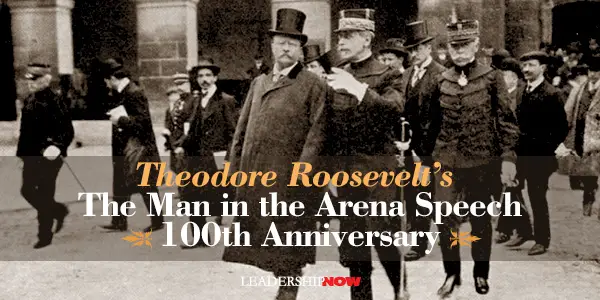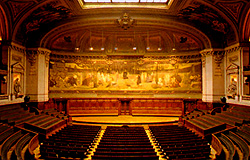 |
 |
04.23.10

Theodore Roosevelt’s The Man in the Arena Speech 100th Anniversary  The speech emphasized his belief that the success of a republic rested not on the brilliance of its citizens but on disciplined work and character; the quality of its people. He told the audience: “Self-restraint, self-mastery, common sense, the power of accepting individual responsibility and yet of acting in conjunction with others, courage and resolution—these are the qualities which mark a masterful people.” And importantly, a democracy needed leaders of the highest caliber in order to hold the average citizen to a high standard. They were to do this not by words alone but by their deeds as well. “Indeed, it is a sign of marked political weakness in any commonwealth if the people tend to be carried away by mere oratory if they tend to value words in and for themselves, as divorced from the deeds for which they are supposed to stand.” Roosevelt firmly believed that one learned by doing. It is better to stumble than to do nothing or to sit by and criticize those that are “in the arena” he explained. “The poorest way to face life is with a sneer.” It is a sign of weakness. “To judge a man merely by success,” he said, “is an abhorrent wrong.” The famous paragraph from that speech, reproduced below, expressed the standard by which he judged himself and others: It is not the critic who counts; not the man who points out how the strong man stumbles, or where the doer of deeds could have done them better. The credit belongs to the man who is actually in the arena, whose face is marred by dust and sweat and blood; who strives valiantly; who errs, and comes short again and again, because there is no effort without error and shortcoming; but who does actually strive to do the deeds; who knows the great enthusiasms, the great devotions; who spends himself in a worthy cause; who at the best knows in the end the triumph of high achievement, and who at the worst, if he fails, at least fails while daring greatly, so that his place shall never be with those cold and timid souls who know neither victory nor defeat. Read the complete text of that speech: Citizenship in a Republic by Theodore Roosevelt Trivia: Theodore Roosevelt was the first President to fly an airplane, to own a car, to have a telephone in his home and travel outside the borders of the U.S. while still in office.
Posted by Michael McKinney at 12:39 AM
|
BUILD YOUR KNOWLEDGE
 

How to Do Your Start-Up Right STRAIGHT TALK FOR START-UPS 
Grow Your Leadership Skills NEW AND UPCOMING LEADERSHIP BOOKS 
Leadership Minute BITE-SIZE CONCEPTS YOU CAN CHEW ON 
Classic Leadership Books BOOKS TO READ BEFORE YOU LEAD |